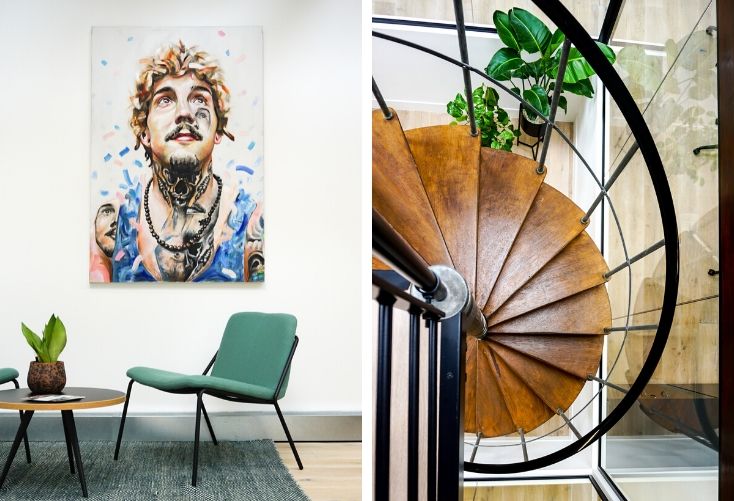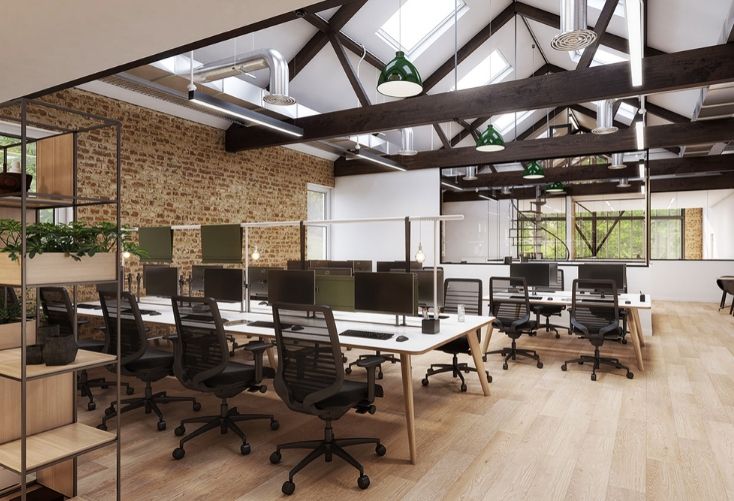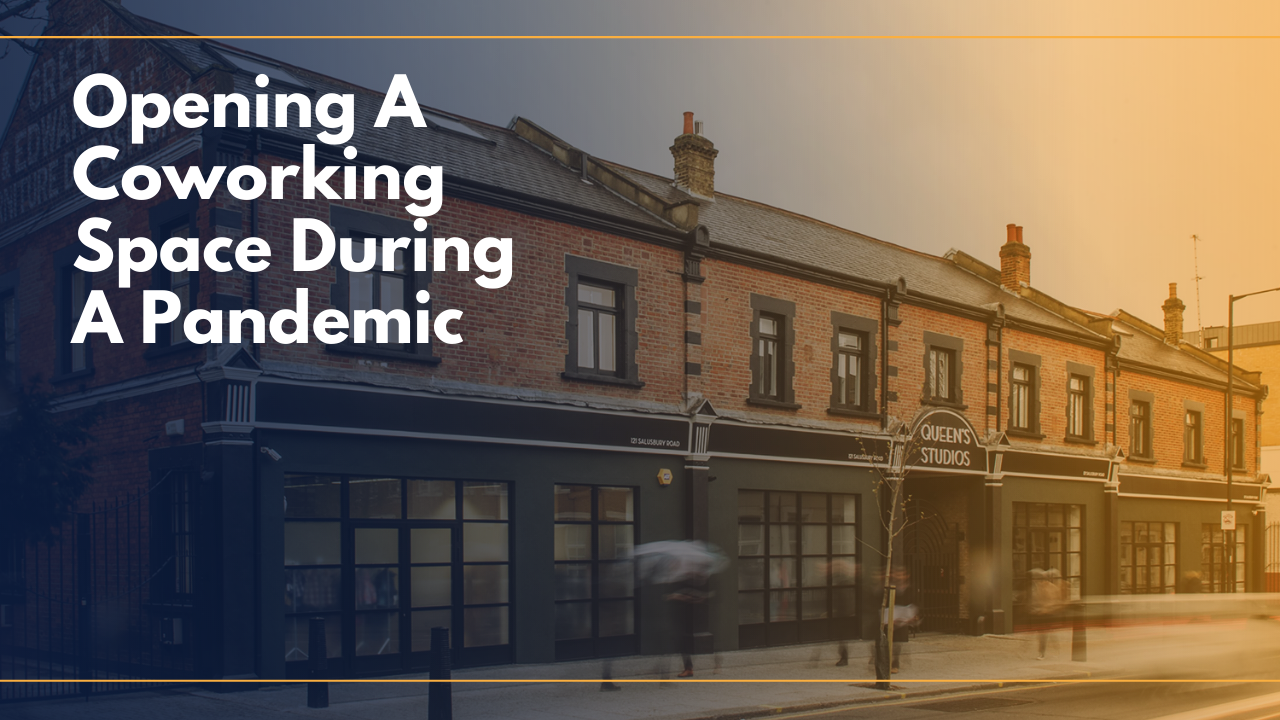- Spacemade is a space-as-a-service company that launched at the end of 2019 and opened a new space in July 2020, during the pandemic.
- Despite the timing, the space is attracting a high volume of enquiries from corporate teams who want to stay away from congested areas.
- Co-founder Jonny Rosenblatt and Community Manager Ricardo Sinclair talk about the challenges they have faced and how they are adapting to the situation.
Starting a business before the onset of a global health crisis isn’t the ideal situation for any entrepreneur. That was the case for Jonny Rosenblatt and Dan Silverman, who co-founded space-as-a-service provider Spacemade at the end of 2019.
However, as it turns out, timing is actually on their side.
“We create bespoke solutions for landlords, and it’s really resonating with the market at the moment,” explained Rosenblatt during an interview with Allwork.Space.

Spacemade is making its mark at a crucial turning point both for the flexible space industry, and for the commercial property companies it serves, by working with landlords to integrate flexibility into their buildings.
Based on operational management agreements, Spacemade provides the end-to-end flexible space infrastructure from design and branding through to fitting out, marketing, and day to day operations.
“We are an extension of the building owner’s team. Our revenue structure is aligned to the success of the building, so if the landlord isn’t making money, we don’t either. That resonates well with landlords, especially at the moment.”
Rosenblatt, who founded UK coworking brand Headspace, started Spacemade after noting a rapid shift in the evolution of flexible space and an opportunity to change the relationship with landlords.
“Flexible space has evolved a lot over the last 5-6 years. Tenants really want flexibility, but landlords have been getting left behind as they don’t necessarily have the operational know-how to deliver it.”
Spacemade fills the void by creating an individual workspace product that fits the building — rather than introducing an existing coworking brand that may not fit the style of the property or the needs of the landlord.

“That enables us to deliver lots of different types of spaces. With my old business I was always looking for a building that fitted our brand and our identity. With Spacemade, we can flex to the needs of the landlord — whether it’s help filling the building, maximising footfall, or providing amenities to other tenants in the building.”
Launching a coworking space during the pandemic

Spacemade has a growing portfolio of spaces, their latest being The Loft, a coworking space in North London’s affluent Queen’s Park suburb, which launched on 1st July 2020.
“It’s been interesting,” said Rosenblatt. “We were initially preparing to launch The Loft at the end of March, which was right when the lockdown started. Obviously timing was not on our side! We delayed the opening, which was the right decision.”
The Loft is run by Community Manager, Ricardo Sinclair, who formerly worked as a cabin crew member for 11 years before moving into the hospitality sector.
His introduction to life in the coworking lane has been somewhat unusual. “Launching a new coworking space in these times has been a bit of a challenge,” he said, “but we’ve embraced it and focused on the needs of our members.”
As The Loft’s Community Manager, Sinclair would normally be spending time with members, running events and building a positive community experience. However in the current situation, his priority now is the health and wellbeing of members and creating an environment that builds trust and confidence.
In addition to physical distancing and sanitiser stations, The Loft adapted to the situation by creating individual booths rather than open plan desking, which enables people to sit near each other but still within their own private booth space.
“After months working from their kitchen table, people are desperate to go somewhere to work. I feel that the idea of working in a flexible working space is more appealing now than it ever has been,” Sinclair added.
So what does a Community Manager do during times like these?
“Lockdown has had an impact on my job,” he said, “however, it gives me the chance to really understand our members, their interests and their needs so that when things do eventually go back to normal, we can provide the best environment and experience for them.”
“Filling up as we speak”
Since opening, The Loft has been receiving enquiries and signing up new members on a daily basis. While this may seem surprising, its suburban location lends itself to entrepreneurs and companies who want to stay away from the congested capital without having to work from home.
“It’s a really strange time to be launching a space,” added Rosenblatt. “What happened over the first month of lockdown was really difficult as it was for most, but we’ve found that positioning it in the right way has helped.
“We’re actually attracting a lot of people from big corporate entities. They don’t want to work from their kitchen table surrounded by housemates for another 3 or 6 months. They want to go somewhere that enables them to work properly. We’re also seeing customers taking space for full teams, for 8 to 10 person teams.

“The space is filling up as we speak.”
Rosenblatt has noticed that many workspace trends that were already emerging, such as the push away from city centres, now seem to be accelerating.
Another trend that’s being adopted at pace is the virtual tour.
“I think this is another shift that was already happening. Previously, an online tour was a nice-to-have. But off the back of what we’ve all been through, there’s more appreciation of our own time. The tech is there, there’s no reason not to be delivering virtual tours. I think this is a really interesting market.”
Spacemade is seeing success from virtual tours, too. “One of the best virtual tours we did was a Zoom tour for someone who lives in London but was stuck in New York at the time. They signed up there and then for an 8 person office!”
Suggested Reading: Virtual Tours: The Lockdown Legacy We’re Happy to Keep
Looking ahead, what’s next for the business and for the flexible office industry? For Rosenblatt, it’s about bringing flexibility to commercial buildings in a way that benefits both the operator and the landlord.
“The shift towards flexibility was happening anyway, and this pandemic will drive that even further. But I don’t think that necessarily means the classic coworking model. That model has its challenges; taking a chunky 15 year lease, paying market value, then trying to make a margin over and above. I think that model is in a bit of trouble, but the product that coworking and serviced office operators provide is exactly what the market needs.
“I think this is only going to become more popular as people look to downsize space, and create more flexibility around their team and where they work. People do want to get back into the office and be somewhere that can separate home and personal life. So while the short term future is going to be hard, the medium to long term future is going to be seismic.”

















